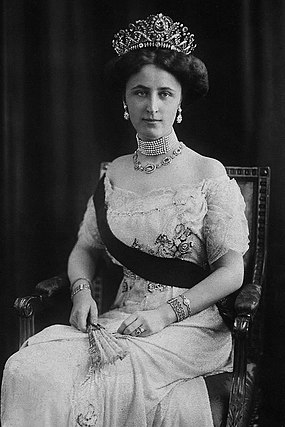by Scott Mehl © Unofficial Royalty 2017

Feodora of Saxe-Meiningen, Grand Duchess of Saxe-Weimar-Eisenach; source: Wikipedia
Feodora of Saxe-Meiningen was the last Grand Duchess of Saxe-Weimar-Eisenach, as the second wife of Grand Duke Wilhelm Ernst. She was born Princess Feodora Karola Charlotte Marie Adelheid Auguste Mathilde on May 29, 1890, in Hanover, Kingdom of Prussia, now in Lower Saxony, Germany, the eldest child of Prince Friedrich Johann of Saxe-Meiningen and Countess Adelheid of Lippe-Biesterfeld. She was named for both her paternal grandmother and great-grandmother, the latter being Princess Feodora of Leiningen, the half-sister of Queen Victoria of the United Kingdom. Feodora had five younger siblings:
- Princess Adelheid of Saxe-Meiningen (1891) – married Prince Adalbert of Prussia, had issue
- Georg, Prince of Saxe-Meiningen (1892) – married Klara-Maria of Korff genannt Schmising-Kerssenbrock, had issue
- Prince Ernst of Saxe-Meiningen (1895) – unmarried, killed in action in 1914
- Princess Luise of Saxe-Meiningen (1899) – married Baron Götz von Wangenheim
- Bernhard, Prince of Saxe-Meiningen (1901) – married (1) Margot Grössler, had issue; (2) Baroness Vera Schäffer von Bernstein, had issue

Grand Duke Wilhelm Ernst. source: Wikipedia
On January 14, 1910, in Meiningen, Duchy of Saxe-Meiningen, now in the German state of Thuringia, Feodora married Grand Duke Wilhelm Ernst of Saxe-Weimar-Eisenach. The marriage was encouraged by Wilhelm II, German Emperor, King of Prussia, a close friend of Wilhelm Ernst, who had been widowed several years earlier. Feodora and Wilhelm Ernst had four children:
- Princess Sophie Luise (1911) – married Friedrich Günther, Prince of Schwarzburg (divorced), no issue
- Karl August, Hereditary Grand Duke (1912) – married Baroness Elisabeth of Wangenheim-Winterstein, had issue
- Prince Bernhard (1917) – married Felicitas of Salm-Horstmar (divorced)
- Prince Georg (1921) – married Gisela Jänisch in 1953, renouncing his rights and taking the name Jörg Brena, had issue

Feodora’s arrival in Weimar, 1910. source: Wikipedia
The marriage was unhappy, and Feodora struggled to cope with the strict etiquette and protocol of the Weimar court. She became very active with charity work, working with organizations that helped the poor. Feodora founded several asylums and hospitals and was the Patron of the Patriotic Institute of Women’s Associations. She also served as head of the central directorate of the Women’s Club of the Red Cross. Her efforts in these areas brought her great respect from the people of the Grand Duchy.
When the monarchy ended and her husband abdicated in November 1918, the family went into exile in Heinrichau, Silesia (now Henryków, Poland), where her husband died several years later. When the area fell under Soviet occupation in World War II, the family was again forced to flee, losing their estates and many of their assets. As a means of negotiating with the authorities, Grand Duchess Feodora agreed to sign over the Goethe and Schiller Archive (link in German), on the condition that it would be converted into a private foundation, and the family’s assets would be returned. Despite the written agreement, the government did not return many of the family’s assets, and the dispute continues today.
Grand Duchess Feodora settled in Freiburg im Breisgau, Germany, where she died on March 12, 1972. She is buried in Bad Krozingen, Germany.
This article is the intellectual property of Unofficial Royalty and is NOT TO BE COPIED, EDITED, OR POSTED IN ANY FORM ON ANOTHER WEBSITE under any circumstances. It is permissible to use a link that directs to Unofficial Royalty.
Saxe-Weimar-Eisenach Resources at Unofficial Royalty
